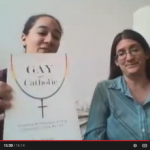(UPDATE: It looks like some of you have questions about bisexuality. Feel free to ask them in the comments and I’ll answer them in tomorrow’s post)
Today is National Coming Out Day (the link goes to Lambda Legal, not HRC, since Lambda puts donations to work on activism and HRC throws party for legislators without much to show for it). That makes today a good day to mention that I’m bisexual to any new readers I’ve picked up here at Patheos.
I mention it because, when you write a blog about theological disputes you have with your Catholic boyfriend, it takes a deliberate effort to not pass for straight. I want to be out about my sexuality for the same reasons I’m out about my atheism. In both cases, I’m part of a small demographic, so, if I’m not out and accessible, I lower the odds that people around me will know they know an atheist or a bisexual person. I don’t want stereotypes to fester in silence, I want to be available for dialogue. (Though I’m certainly not doing much to dispel any stereotypes of atheists as motormouths).
In that spirit, I want to open up a conversation about gay marriage on two specific questions. You can bring up other LGBT-related things in the comments, but I can’t guarantee I’ll address them, since I want to keep the conversation focused.
Question One is just a repeat of the question I asked in “Put Your Money Where Your Marriage Is.”
If you think the legalization of gay marriage will have severe negative effects, I want to hear from all of you about what specific data you expect. Tell me how you’ll make your beliefs pay rent. One caveat: I don’t want citations for research that’s been conducted. That’s going to derail everyone into methodological nitpicking. I want open ended brainstorming, not problems with anchoring effects and privileging the hypothesis.
The same caveats apply as last time: its fine to claim as evidence events that liberals don’t necessarily see as poor outcomes (increase in polyamory, more cohabitation, etc). All you have to do is explain what evidence you expect to see with enough detail that the prediction is testable. (So, “I predict that more children will be born out of wedlock” is better than “Children will be worse off”). Let us know if you think a prediction reflects your true rejection – if it doesn’t come true, would you reconsider your opposition?
But maybe your anticipated consequences don’t fit into an empirical model (e.g. “I predict more souls will go to Hell”). Fortunately, you (and everyone else) can still take a crack at…
Question Two: If you think gay marriage is a bad idea, is your justification accessible to people outside your faith?
Some moral laws that religions promote seem like a good idea to pretty much everyone (e.g. “Thou shalt not kill”). But others only make sense if you’ve already accepted the basic premise of the religion. There’s no good way to convince a secular Jew to keep kashrut unless you can convince them that there’s a god who has chosen them and requires their obedience. So where on this spectrum would you put the gay marriage question?
If you’ve got it in the cloth-of-two-fabrics category, I don’t see that’s there’s any point in trying to sell heathens like me on the law before you’ve gotten us on board with a Lawgiver. If you’re more of a natural law type, perhaps you’d like to write a guest post.












